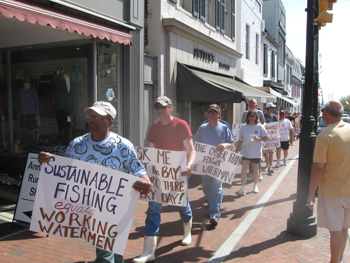
 |

|

By BRADY HOLT
Capital News Service
Wednesday, April 7, 2010
ANNAPOLIS - Maryland's watermen returned to Annapolis Wednesday to support a bill that would increase penalties on oyster poachers and delay the state from designating additional portions of the Chesapeake Bay and its tributaries as oyster sanctuaries.
Dozens of watermen pulled their fishing boats into Annapolis Harbor before marching up Main Street toward Lawyer's Mall outside the State House -- a hangout that has become increasingly familiar to many workers in an industry that has spent the General Assembly's 2010 legislative session fighting for its survival.
Watermen have said that legislation closing off more oyster beds as sanctuaries would put many out of business.
Wednesday's demonstration -- in which participants carried such signs as "I WILL WORK FOR YOUR FOOD" and "THE OYSTER PLAN FORGOT THE WATERMAN" -- marked at least the third visit to Annapolis this year for many of the assembled watermen and their families -- who organizers said numbered 75 to 100.
They face off against such "dry county" legislators as Sen. Brian Frosh, D-Montgomery, who said Wednesday that the long-term health of the bay takes precedence over watermen's immediate interests.
"Hunter-gatherers in society are being squeezed out all over the world," Frosh testified at the House Environmental Matters Committee. "This is not one of the industries of the future."
Dozens of watermen testified at committee hearings earlier this year, trying to fight the influence of legislators from parts of the state without a direct interest in the bay's fishing industry, and who the watermen say often lack experience on their issues.
"We've got everybody over here on the Western Shore making all the laws, they want to change everything every time there's a bad season," said Billy Joyce, 40, of Kent Island, who said he has been oystering for half his life. "With all these rivers over here, there ain't nothing in none of them, so now they're going to go over there (to the Eastern Shore) and tell us what we're doing wrong on that side."
Joyce and other watermen added that the oyster's problem is pollution, not over-harvesting.
The bill heard Wednesday at the House Environmental Matters Committee would originally have only revoked the oyster harvesting licenses of watermen caught illegally collecting the shellfish.
An amendment to the bill that narrowly passed the Senate would prevent the Department of Natural Resources from closing off any additional oyster beds to harvesting until next April -- a full season after the department's original plan.
According to the department's fisheries director, Tom O'Connell, the bay's low oyster population -- 1 percent of historic levels -- requires immediate attention.
Sanctuaries would give oysters the opportunity to develop natural immunity to disease, O'Connell said, and delaying sanctuary programs by another season would encourage oysterman to go all out when the next season begins in October.
Most watermen are opposed to any oyster sanctuaries -- including the nine percent of the bay already protected from harvesting -- much less the increase to nearly 25 percent that the department hopes to implement later this year.
David Leonard, 57, of Preston, said he and his fellow watermen spent years restoring the oyster beds that the state now wants to put off limits, and said that regular harvests prevent silt from building up and killing oysters.
"That's what we're against: them taking the bottom that we worked and brought back and are trying to make a living on," said Leonard, who started oystering when he was 13.
Neither the watermen nor any other witnesses were invited to testify on Wednesday, however, because the poaching and sanctuary bill had already received a full public hearing in the Senate. Dozens still attended the short hearing and stood at one point to show their presence.
Frosh, who introduced the original poaching bill but opposed its sanctuary amendment, described the need for oyster protection as "a classic tragedy of the commons."
"If you don't set aside sanctuaries, it's in the interest of everybody to take as many oysters as they possibly can," Frosh said.
There was less disagreement on the bill's poaching provisions, with some of the watermen sympathizing with poachers but recognizing a need for stricter laws.
"People got to pay their bills ... so what do you do? You've got to go out there at nighttime somewhere you ain't supposed to be because that's what the state forced you to do," Joyce said.
But is the tougher anti-poaching legislation still a good idea?
"I guess so," Joyce said with a sigh. "But I would really rather see the state do something, make it so you don't have to poach."